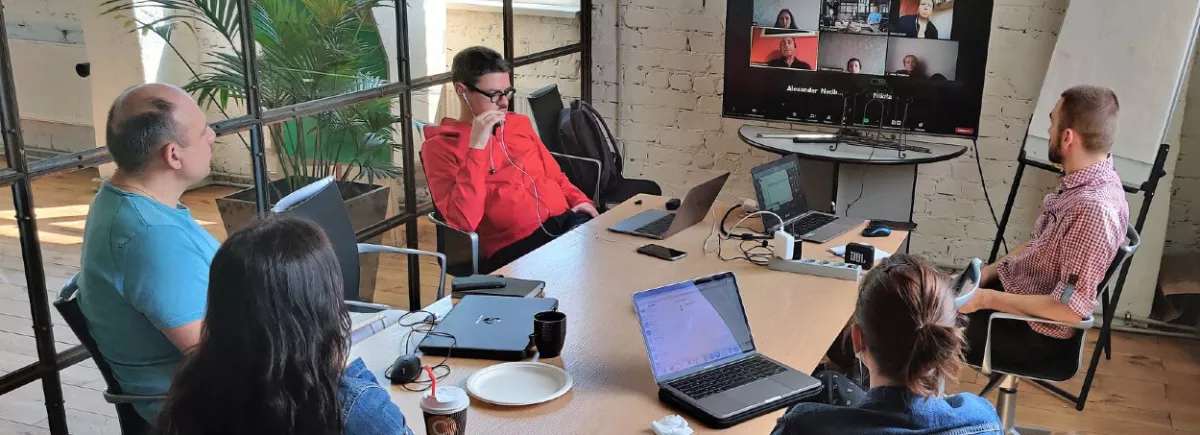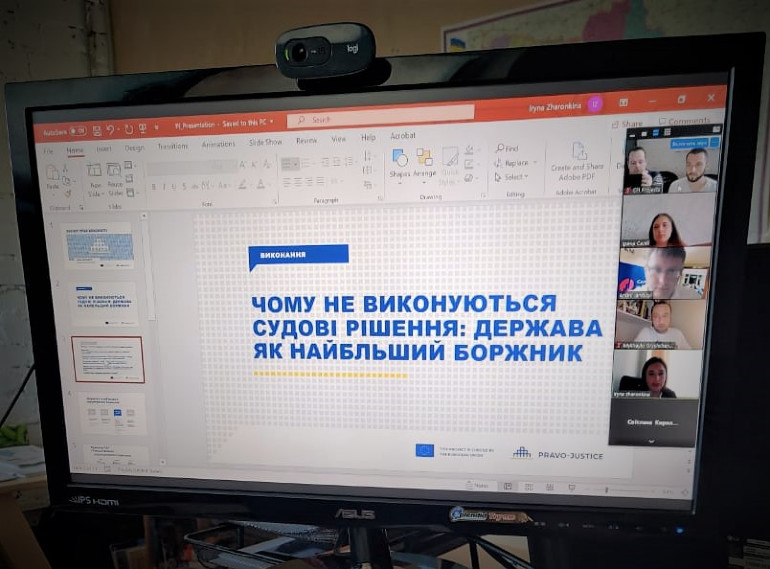
Nine professionals improve thier skills in Justice Journalism
Related project
PRAVO-Justice: the media componentA second group of 9 Ukrainian journalists has finished the Justice Journalism training programme of CFI, which took place from October 2019 to June 2020.
The programme consists of three two-three days sessions aimed at building participants' capacity in reporting on justice issues and the ongoing reforms, with a focus on court reporting. Moreover, the programme's fund helps participants to produce quality journalistic materials for their respective media-outlets.
The training module, based on specific examples related to the practice of justice journalism in France, was designed and led by Thierry Cruvellier and Franck Petit, two French journalists, experts in transitional and international justice. They are assisted by two Kyiv-based journalists with expertise in the Ukrainian justice system, Serhii Andrushko and Irina Saliy, who draw on their own practice and experience to enrich the programme and act as coaches to support the trainees in producing their work.
During the training sessions, the French and Ukrainian trainers invite judges, lawyers and other professionals of the justice, to give a wider perspective to several aspects of journalism in courts, and to bring their own relevant experience. Court reporters shouldn't give their opinion.This approach was already tested with the first group of journalists, trained previously in 2019 and will be further implemented with the third group during the autumn 2020. The latest group gathered journalists from Kyiv, but also from Lviv, Vinnitsa and Sumy.
It has become a tradition, the inaugural session is held by Pascale Robert-Diard, senior reporter at the French daily newspaper Le Monde, widely recognized as one of the best justice journalists in France. Pascale has dedicated the last 25 years to “the art of court reporting". Six of her reference articles have been translated in Ukrainian, and were shared with our participants to show them the variety of genres within the journalistic exercise of court reporting
Once again, Pascale Robert-Diard has held an inspiring masterclass, explaining how the political reporter she was specialized herself in justice journalism. She introduced covering courts as “a journey through human passions and all the worst that men are capable of doing." Pascale explained at length the practice of court reporting (“chronique judiciaire", in French), of which she has become an expert.
"Court reporters shouldn't give their opinion. They have to give the facts, be as sober as possible; they must know what they want to make people feel. At the end of your article, your reader must feel it, but without you imposing it on him from the beginning", says Pascale Robert-Diard. How to cover a dysfunction in the justice system? How to cover a miscarriage of justice? What precautions must be taken in physical descriptions? How do we protect ourselves from interpretation? These were some of the questions raised.
“In my opinion, the masterclass with the French journalist Pascale Robert-Diard was the most interesting session", comments Nikita Panasenko, one of the participants. “I especially remember her story about the "aristocratic" murder, when we felt a sense of complete immersion in the story - only a glass of wine was missing. I was also very interested by her advice to pay less attention to information leaks by justice actors, but to focus more on what is exactly said during the court hearings and how it is said."

Webinar to continue training despite Covid-19
Another highlight of this second cycle of training was the discussion between journalists and the famous criminal lawyer Masi Nayyem. " We need journalists, but we want them to work within a legal framework. The lawyer usually only makes public what is positive for his client, otherwise he refrains from commenting", according to Nayyem. When a lawyer violates the secrecy of the investigation, he can be punished. A journalist who does so cannot be punished. Masi Nayyem's presentation allowed the participants to better grasp the point of view and interests of a lawyer who has thought about how he works with the media, strategically, in the interest of his client, in a very modern way of communication or manipulation of the journalists. A journey through human passions and all the worst that men are capable of doing.
During the last session "War Crimes & Transitional Justice After Wars" Thierry Cruvellier introduced the concept of war crime justice, the history of international courts and the idea behind them. The nine trained journalists could apprehend the differences between classifications of genocide, war crimes and crimes against humanity, while in Ukraine many media professionals often confuse these notions and terms in their works. Training work on war crimes and justice is particularly relevant in Ukraine, where many of the cases handled by the press at the national and regional level relate to the war in the Donbass or the annexation of the Crimea.
Thierry Cruvellier, editor-in-chief of the Justice Info portal, dedicated to transitional justice, has reported over the past 20 years in international courts. Each of the international courts on conflicts in former Yugoslavia, Rwanda, Cambodia, Lebanon, Kosovo and others have their own specifics in jurisdiction, various backgrounds of courts creation and their duration of existence, and of course the results. Transitional justice implementation also depends on each particular conflict, as the history knows the both successful and failed cases.
“For me, as a journalist with experience in court reporting", Tetiana Kozak sums up, “the CFI course added an understanding of how to improve the quality of my materials - on the examples of the work of professional French journalists. Besides, to understand in more detail how the system of national and international justice works, and discuss it with the representatives of this system: judges, lawyers and investigators. The program is useful and provides an interesting comparison of the realities of the courts work in Ukraine and abroad."
The training programme for journalists of CFI is carried out within the European Union-funded PRAVO-Justice project.


